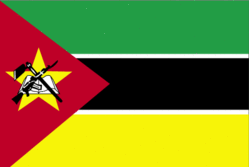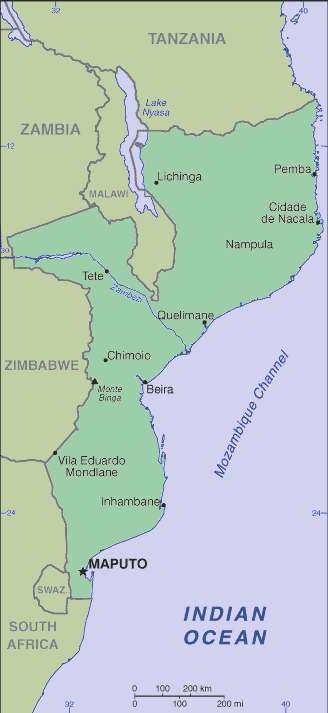Traveling Luck for Mozambique. Mozambique, Africa
Mozambique is located in Southeastern Africa, bordering the Mozambique Channel, between South Africa and Tanzania.
Land in Mozambique is mostly coastal lowlands, uplands in center, high plateaus in northwest, mountains in west.
Mozambican land covers an area of 801590 square kilometers which is slightly less than twice the size of California
Mozambique has borders with Malawi for 1569km, Swaziland for 105km, Tanzania for 756km, South Africa for 491km, Zambia for 419km and Zimbabwe for 1231km.
 Mozambican national flag (Flag of Mozambique)
Mozambican national flag (Flag of Mozambique)
As for the Mozambican climate; tropical to subtropical.
Mozambican(s) speak Emakhuwa 26.1%, Xichangana 11.3%, Portuguese 8.8% (official; spoken by 27% of population as a second language), Elomwe 7.6%, Cisena 6.8%, Echuwabo 5.8%, other Mozambican languages 32%, other foreign languages 0.3%, unspecified 1.3% (1997 census).
Places of note in Mozambique
 Mozambican map
Mozambican map
Regions of Mozambique
Almost five centuries as a Portuguese colony came to a close with independence in 1975. Large-scale emigration by whites, economic dependence on South Africa, a severe drought, and a prolonged civil war hindered the country's development. The ruling Front for the Liberation of Mozambique (FRELIMO) party formally abandoned Marxism in 1989, and a new constitution the following year provided for multiparty elections and a free market economy. A UN-negotiated peace agreement between FRELIMO and rebel Mozambique National Resistance (RENAMO) forces ended the fighting in 1992. In December 2004, Mozambique underwent a delicate transition as Joaquim CHISSANO stepped down after 18 years in office. His newly elected successor, Armando Emilio GUEBUZA, has promised to continue the sound economic policies that have encouraged foreign investment.
At independence in 1975, Mozambique was one of the world's poorest countries. Socialist mismanagement and a brutal civil war from 1977-92 exacerbated the situation. In 1987, the government embarked on a series of macroeconomic reforms designed to stabilize the economy. These steps, combined with donor assistance and with political stability since the multi-party elections in 1994, have led to dramatic improvements in the country's growth rate. Inflation was reduced to single digits during the late 1990s although it returned to double digits in 2000-03. Fiscal reforms, including the introduction of a value-added tax and reform of the customs service, have improved the government's revenue collection abilities. In spite of these gains, Mozambique remains dependent upon foreign assistance for much of its annual budget, and the majority of the population remains below the poverty line. Subsistence agriculture continues to employ the vast majority of the country's work force. A substantial trade imbalance persists although the opening of the Mozal aluminum smelter, the country's largest foreign investment project to date, has increased export earnings. In late 2005, and after years of negotiations, the government signed an agreement to gain Portugal's majority share of the Cahora Bassa Hydroelectricity (HCB) company, a dam that was not transferred to Mozambique at independence because of the ensuing civil war and unpaid debts. More power is needed for additional investment projects in titanium extraction and processing and garment manufacturing that could further close the import/export gap. Mozambique's once substantial foreign debt has been reduced through forgiveness and rescheduling under the IMF's Heavily Indebted Poor Countries (HIPC) and Enhanced HIPC initiatives, and is now at a manageable level.
Mozambican natural resources include coal, titanium, natural gas, hydropower, tantalum, graphite
the Zambezi flows through the north-central and most fertile part of the country
Mozambican religion is Catholic 23.8%, Muslim 17.8%, Zionist Christian 17.5%, other 17.8%, none 23.1% (1997 census).
Natural hazards in Mozambique include severe droughts; devastating cyclones and floods in central and southern provinces.
Travel Advice for Mozambique
MozambiqueSUMMARY
- On 1 January 2007 the old Mozambican currency, MTS, ceased to be legal tender. Only MTn (new notes) are accepted. MTn is a transitional name for the new currency, which will be called MTS from 1 July 2007. Check carefully when changing money and receiving change to avoid fraud and old currency.
- Mozambique shares with other countries in Africa a threat from terrorism to visibly Western and British interests. You should also be aware of the global risk of indiscriminate terrorist attacks which could be against civilian targets, including places frequented by foreigners.
- Most visits to Mozambique are trouble-free but you should be aware of the risks of violent crime, poor road safety standards and minimal health facilities. The main type of incident for which British nationals require consular assistance in Mozambique are street robberies (10 cases in 2005). You should also be aware of the occurrence of violent attacks on beaches in Mozambique at any time of day.
- In February 2007 the Mozambican authorities issued a severe flood warning for the entire zone along the Zambeze River, from Zumbo on the border with Zimbabwe, to Marromeu on the Indian Ocean. This includes the Cahora Bassa Dam and the river crossing point for the main north/south road, the EN1, at Caia.
- We strongly recommend that you obtain comprehensive travel and medical insurance before travelling. You should check any exclusions, and that your policy covers you for the activities you want to undertake. Please see Travel Insurance.
SAFETY AND SECURITY
You should be aware of the occurrence of violent attacks on beaches in Mozambique at any time of day. Since the start of 2005, there have been several serious attacks, some including rape, against British nationals and other westerners walking on beaches at Maputo, Beira, Vilanculos, Inhambane, and other tourist centres. Beaches may look isolated and safe, especially on offshore islands but they are not policed.
There have been several incidents of bag snatching from tourists and thefts of unattended bags. Safeguard and avoid displaying valuables and cash. Deposit them in hotel safes, where practical. Keep notarised copies of your passport’s biodata pages and other important documents in a separate place to the documents themselves.
Avoid isolated picnic spots.
Local Travel
Due to a month of heavy rains, in February 2007 the Mozambican authorities issued a severe flood warning for the entire zone along the Zambeze River, from Zumbo on the border with Zimbabwe, to Marromeu on the Indian Ocean. This includes the Cahora Bassa Dam and the river crossing point for the main north/south road, the EN1, at Caia.
Road Safety
Driving and vehicle standards are extremely poor.
Overland travel on public transport can be hazardous due to the poor mechanical condition of many vehicles and the bad state of many roads.
You should check that you have third party insurance cover in Mozambique. There are insurance company offices at most land border crossings if you need to purchase this.
Air Safety
The EU has published a list of air carriers that are subject to an operating ban or restrictions within the community. You should check the following link to see whether this will affect your travel: http://europa.eu.int/comm/transport/air/safety/flywell_en.htm
LOCAL LAWS AND CUSTOMS
Drug taking and smuggling is an offence. The punishments can be severe.
It is illegal to photograph public buildings in Mozambique.
Mozambique does not recognise dual nationality for its citizens.
ENTRY REQUIREMENTS
You should ensure that you have the correct visa for the purpose of your visit and obtain a clear explanation of the visa's validity and what it allows you to do.
Your passport should be valid for a minimum of six months and have at least two blank pages.
It can take a long time to clear border formalities at the land crossing with South Africa: Lebombo/Ressano Garcia, especially during holiday periods. You should allow adequate time to arrive at your destination before nightfall.
HEALTH
Hospital facilities are generally poor. In cases of serious illness or injury, medical evacuation to South Africa or the UK may be necessary.
Malaria is endemic. Before travelling you should seek medical advice on suitable anti-malarial medication and after arrival take precautions to avoid being bitten by mosquitoes. More than three-quarters of British travellers who contracted malaria in 2005 did not take preventive measures, such as malaria prevention tablets. However, malaria can occur despite appropriate prevention, and therefore you should promptly seek medical care in the event of a fever or flu-like illness in the first year following your return from travelling to a malaria risk country. Before travelling you should seek medical advice about the malaria risk in Mozambique.
Diseases caused by unsanitary conditions are common throughout Mozambique. Cholera and other water-born diseases are prevalent particularly during the rainy season. You should drink bottled or boiled and filtered water and eat only food, which has been thoroughly cooked, and basic hygiene precautions have been taken.
There is a high level of HIV and AIDS in the country; you should be alert to the dangers of unprotected sex.
You should seek medical advice before travelling and ensure that all appropriate vaccinations are up-to-date. For further information on health, check the Department of Health’s website at www.dh.gov.uk.
GENERAL
The British High Commission in Maputo does not issue full passports. We accept completed forms for transmission to the British High Commission in Pretoria, which issues passports for British nationals resident in or visiting Mozambique. It can take up to eight weeks for standard applications to be processed. The High Commission in Maputo can issue Temporary Passports and in certain circumstances Emergency Passports. Full details of passport services for British nationals resident in or visiting Mozambique are available on the High Commission's website.
You should register with the British High Commission Consular Section in Maputo on arrival, either in person or by e-mail (bhc.consular@tvcabo.co.mz), providing a completed form and proposed itinerary. Forms are available on the British High Commission's website.
You should check with your bank about using your card in Mozambique before depending on it. Travellers' cheques are not commonly accepted and are often difficult to change. US Dollars and South African Rand are the main exchange currencies.
In January 2006 Mozambique changed its currency from MTS to MTn: removing the last three zeros, i.e.moving from £1 = 50,000 MTS (approx.) to £1 = 50 (approx.) MTn. On 1 January 2007 the old MTS currency ceased to be legal tender and is no longer accepted. MTn is a transitional name for the new currency, which will be called MTS from 1 July 2007. Check carefully when changing money and receiving change to avoid fraud and old currency.
OTHER

 Search
Search Mozambique country profile
Mozambique country profile Travel advice for Mozambique
Travel advice for Mozambique